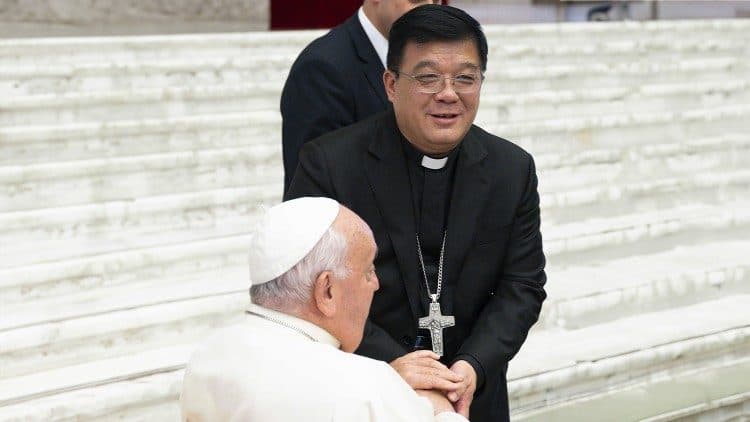ROME – Two bishops from mainland China attending this month’s Synod of Bishops on Synodality have stressed to other participants the importance of collaboration in charitable and social works, as well as the importance of respecting all cultures.
According to Vatican News, the Vatican’s official state-run information platform, Bishop Joseph Yang Yongqiang in remarks a few days ago said, “The Church in China is the same as the Catholic Church in other countries of the world.”
“We belong to the same faith, share the same baptism, and we are all faithful to the one, holy, catholic, and apostolic Church,” he said.
Yang Yongqiang leads the Diocese of Hangzhou, capital of Zhejiang Province in China, and is one of two bishops from mainland China attending this month’s Oct. 2-27 closing session of the Synod of Bishops on Synodality.
He is joined by Bishop Vincent Zhan Silu of Xiapu (Funing) in the coastal province of Fujian.
Their presence marks the third time that bishops from mainland China have taken part in a synodal assembly, following the 2018 Synod of Bishops on Youth and last year’s first session of the Synod on Synodality.
Last year two bishops from mainland China also participated in the first part of the gathering but left roughly halfway through, due to what the Vatican said were pastoral needs in their dioceses.
So far, Yang Yongqiang and Zhan Silu are still in Rome despite the fact that the synod has already breached the halfway point, indicating that they might stay for the entire month.
Their presence is seen as part of a broader rapprochement between the Holy See and China in the wake of a 2018 provisional agreement on the appointment of bishops, which has twice been renewed and is expected to be renewed again this month.
Prior to the 2018 agreement, bishops from mainland China were unable to participate in the Rome events such as the Second Vatican Council or any of the synods of bishops that followed.
Yang Yongqiang in his remarks during the synod said the Church in China follows “the evangelical spirit of ‘becoming all things to all people.’”
“We effectively adapt to society, serve it, adhere to the direction of the Sinicization of Catholicism, and preach the Good News,” he said.
The Catholic Church in China, he said, “has initiated active exchanges with Catholic communities around the world based on the principles of equality, friendship, and mutual respect.”
Various exchanges are conducted on issues such as evangelization, pastoral care, social services and theological studies, Yang Yongqiang said, saying they also work to promote peace.
“We actively participate in international meetings and prayer activities of religions for peace; we strive to be like ‘light and salt’ for world peace and the promotion of a community where humanity can enjoy a shared destiny,” he said.
He said the Church in China also promotes development through various projects and extended a welcome “to Catholic communities and religious groups from all countries who wish to visit the Church in China.”
Zhan Silu for his part focused on the history of Christianity in China and the difficulties missionaries encountered in their efforts to evangelize due to cultural misunderstandings.
He specifically pointed to Jesuit missionary Father Matteo Ricci and his “experiment” of adapting “the Christian Gospel to different human practices.”
“The discernment between cultural differences and the need to preserve the authenticity of the Christian faith became a source of confusion for missionaries in China,” Zhan Silu said, noting that this eventually led to the Rites Controversy, which took place in his diocese, in Mindong.
Lasting from around 1582–1742, the Rites Controversy was a debate among foreign Catholic missionaries over the religiosity of Confucianism and Chinese rituals during the 17th and 18th centuries.
The dispute was largely characterized by a quarrel among different Catholic orders as to whether Chinese converts could observe traditional rites and use non-Catholic terms such as tian and shangdi to refer to the Christian God.
“From a historical perspective, one of the reasons for this setback was that the Church ignored the differences and complementarity of human cultures,” Zhan Silu said.
To this end, he insisted that “being a synodal Church engaged in the mission of evangelization means respecting and listening to the voices of different stories, cultures, and traditions in the journey of seeking humanity’s ultimate goal, which is God.”
Among the issues the Church in China must face with fresh eyes, he said, is “how to address the challenges that mixed marriages present for family education; how to adapt to local laws and regulations; or how to resolve the confusion that exists among the laity between popular beliefs and some aspects of traditional culture.”
Zhan Silu said the as it grapples with a new era “has been given a new task of discernment, even though the voice of the Holy Spirit is always gentle and difficult to distinguish.”
“For this very reason, learning humbly from both historical and current experiences is an important way to evangelize, that is, to discern the new path the Lord is indicating to the Church,” he said.
Follow Elise Ann Allen on X: @eliseannallen













